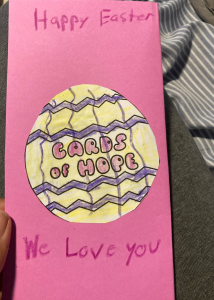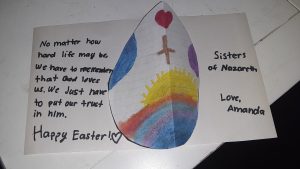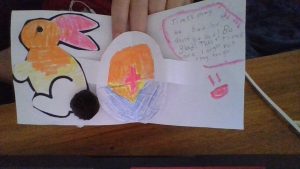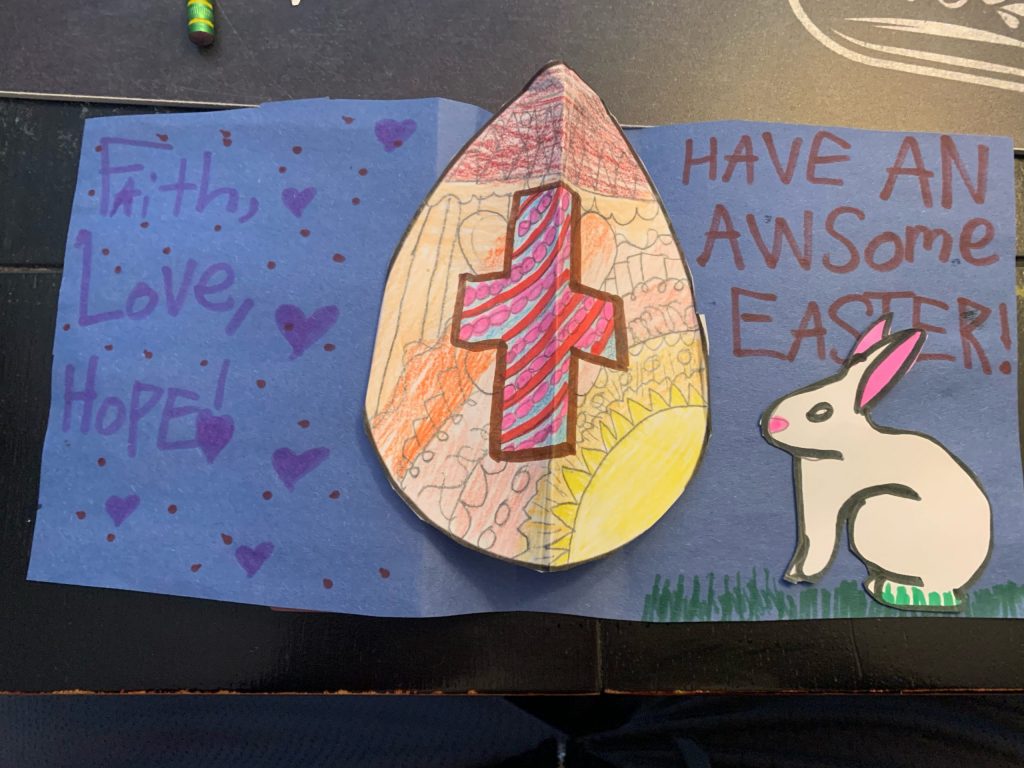A new outreach project from the Archdiocese of Los Angeles is relying on the creative skills of local Catholic kids to bring Easter hope to those still suffering from COVID-19-induced isolation.
Cards of Hope is an initiative of the Catholic Communication Collaboration (C3) Maker Initiative’s Thinker Tank group. The idea: To harness the imagination and engineering talents of elementary-aged children in school and parish programs across the archdiocese to create pop-up greeting cards with Easter-themed messages of encouragement.
The 3D handmade greetings are sent to the office of the Vicar for Women Religious, which coordinates their distribution by women religious to the many in need whom they serve.
It is a project that brings with it all sorts of teachable moments, organizers say.

“Easter is a wonderful opportunity to promote family faith in the home, and parents have been asking if they can participate with their children on an activity,” said Douglas E. Zuniga, Coordinator of Elementary Catechesis for the archdiocese. “The answer is ‘of course, yes!’
For one, the project is an opportunity to bring families together around a common purpose. But the ultimate objective is to bring hope to those who have suffered the most from this year of pandemic.
“There are many elderly still locked down for many months, with limited visitors, including sisters who are isolated in their own convents afraid of the virus,” he explained.
The initiative is the brainchild of Gretchen Castello, who oversees C3’s “Mobile Maker” team. She said the card idea comes at a time in which the do-it-yourself world of Cricut Maker cards is exploding in popularity with the help of social media, and notes there are hands-on geometry and physics lessons to be learned from making cards that come alive with accordion-folded paper, tissue paper and glue.
The low-tech cards that spring open with elements such as artistic paper eggs, crosses and a sunrise display need only “minimal instruction,” said Castello.
Most importantly, they invite children as young as 3 or 4 to express Easter-themed messages of hope such as “rejoice” or “He has risen” and compose a note of encouragement or inspiration for someone they may not know.
There is even the value taught in how to address (or even create) an envelope to mail the cards.

“There are no wrong ways to do this,” Castello said. “They just need very basic tools. This is showing them how to figure things out and giving the basic tools so they can bring the creativity. It’s about generating fun and the love of making.”
Castello, who has been leading in-person Cards of Hope workshops at various parochial schools around the archdiocese this week, will cap the project off with a virtual workshop on Saturday, March 20 with a pair of hour-long sessions for ages 6-to-8 and 9-to-11. As of March 17, free online registration for the workshop was still available.
During registration, families are given a number that will coordinate to where the cards are to be mailed and delivered by the sisters. The only cost is a postage stamp.
It is a project that Castello envisions being the start of something that resonates for years to come.

As the pandemic dragged on into Christmas time last year, Castello said she joined a group called “Letters to the Isolated.” But she realized there were rules against making the cards religiously oriented or offering prayers.
“I decided then I needed to do something myself,” said Castello, who ended up doing virtual puppet shows at Christmas with Zuniga for the children.
Cards of Hope will also have a specific symbolic logo attached to the back of the projects to identify its origins. The plan is to do more of these kinds of projects in the future.
Castello’s goal is to have 500 cards made for Easter by the children, and she said a virtual classroom can handle as many who want to join.
“We want this to be a movement within the Catholic Church that we can give a prayer or a blessing in many ways,” said Castello. “It’s getting the children excited that they’re the ones giving and not the ones receiving.”

